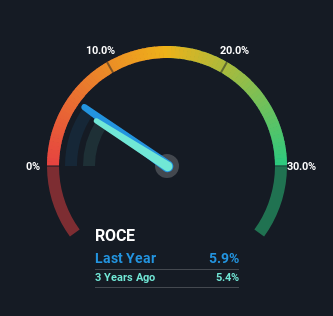- United States
- /
- Semiconductors
- /
- NasdaqGS:CSIQ
Be Wary Of Canadian Solar (NASDAQ:CSIQ) And Its Returns On Capital

What are the early trends we should look for to identify a stock that could multiply in value over the long term? One common approach is to try and find a company with returns on capital employed (ROCE) that are increasing, in conjunction with a growing amount of capital employed. This shows us that it's a compounding machine, able to continually reinvest its earnings back into the business and generate higher returns. However, after investigating Canadian Solar (NASDAQ:CSIQ), we don't think it's current trends fit the mold of a multi-bagger.
Return On Capital Employed (ROCE): What Is It?
For those who don't know, ROCE is a measure of a company's yearly pre-tax profit (its return), relative to the capital employed in the business. Analysts use this formula to calculate it for Canadian Solar:
Return on Capital Employed = Earnings Before Interest and Tax (EBIT) ÷ (Total Assets - Current Liabilities)
0.059 = US$374m ÷ (US$12b - US$6.0b) (Based on the trailing twelve months to March 2024).
Thus, Canadian Solar has an ROCE of 5.9%. In absolute terms, that's a low return and it also under-performs the Semiconductor industry average of 9.0%.
Check out our latest analysis for Canadian Solar

In the above chart we have measured Canadian Solar's prior ROCE against its prior performance, but the future is arguably more important. If you're interested, you can view the analysts predictions in our free analyst report for Canadian Solar .
The Trend Of ROCE
The trend of ROCE doesn't look fantastic because it's fallen from 16% five years ago, while the business's capital employed increased by 215%. That being said, Canadian Solar raised some capital prior to their latest results being released, so that could partly explain the increase in capital employed. The funds raised likely haven't been put to work yet so it's worth watching what happens in the future with Canadian Solar's earnings and if they change as a result from the capital raise.
On a side note, Canadian Solar has done well to pay down its current liabilities to 49% of total assets. That could partly explain why the ROCE has dropped. Effectively this means their suppliers or short-term creditors are funding less of the business, which reduces some elements of risk. Since the business is basically funding more of its operations with it's own money, you could argue this has made the business less efficient at generating ROCE. Either way, they're still at a pretty high level, so we'd like to see them fall further if possible.
The Key Takeaway
To conclude, we've found that Canadian Solar is reinvesting in the business, but returns have been falling. And in the last five years, the stock has given away 34% so the market doesn't look too hopeful on these trends strengthening any time soon. Therefore based on the analysis done in this article, we don't think Canadian Solar has the makings of a multi-bagger.
One more thing: We've identified 4 warning signs with Canadian Solar (at least 2 which are a bit concerning) , and understanding these would certainly be useful.
For those who like to invest in solid companies, check out this free list of companies with solid balance sheets and high returns on equity.
If you're looking to trade Canadian Solar, open an account with the lowest-cost platform trusted by professionals, Interactive Brokers.
With clients in over 200 countries and territories, and access to 160 markets, IBKR lets you trade stocks, options, futures, forex, bonds and funds from a single integrated account.
Enjoy no hidden fees, no account minimums, and FX conversion rates as low as 0.03%, far better than what most brokers offer.
Sponsored ContentNew: AI Stock Screener & Alerts
Our new AI Stock Screener scans the market every day to uncover opportunities.
• Dividend Powerhouses (3%+ Yield)
• Undervalued Small Caps with Insider Buying
• High growth Tech and AI Companies
Or build your own from over 50 metrics.
Have feedback on this article? Concerned about the content? Get in touch with us directly. Alternatively, email editorial-team (at) simplywallst.com.
This article by Simply Wall St is general in nature. We provide commentary based on historical data and analyst forecasts only using an unbiased methodology and our articles are not intended to be financial advice. It does not constitute a recommendation to buy or sell any stock, and does not take account of your objectives, or your financial situation. We aim to bring you long-term focused analysis driven by fundamental data. Note that our analysis may not factor in the latest price-sensitive company announcements or qualitative material. Simply Wall St has no position in any stocks mentioned.
Have feedback on this article? Concerned about the content? Get in touch with us directly. Alternatively, email editorial-team@simplywallst.com
About NasdaqGS:CSIQ
Canadian Solar
Provides solar energy and battery energy storage products and solutions in in Asia, the Americas, Europe, and internationally.
Undervalued with reasonable growth potential.
Similar Companies
Market Insights
Community Narratives


